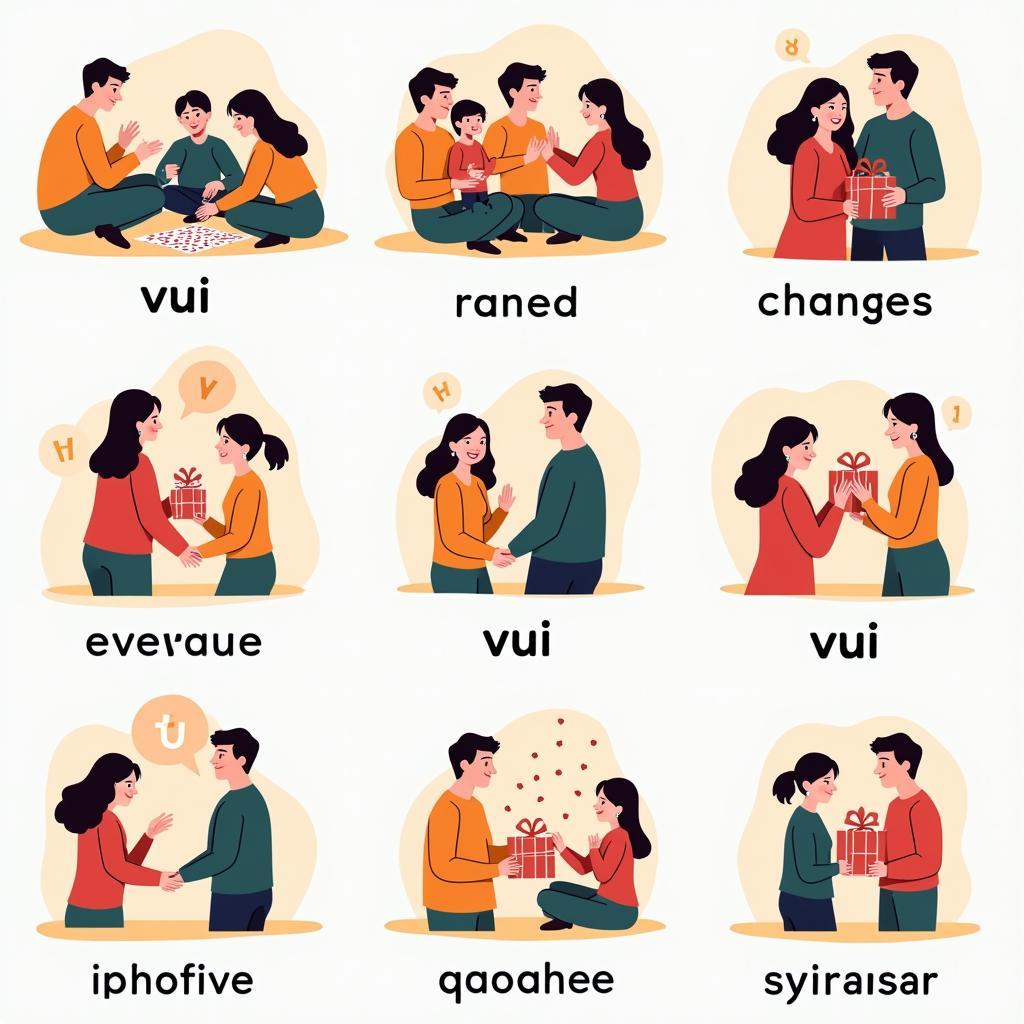
“Vui” in English, a simple word yet bursting with a spectrum of emotions. From the quiet contentment of a cozy afternoon to the exhilarating rush of a thrilling adventure, how do we capture this essence in another language? This exploration delves into the vibrant world of expressing “vui” and its many facets in English. đi chơi vui vẻ nhé tiếng anh
Expressing “Vui” in Everyday English
The most common translation for “vui” is “happy.” It’s a versatile word that fits many situations, from expressing general contentment (“I’m happy with my life”) to describing a moment of joy (“I’m so happy to see you!”).
- Happy: The cornerstone of expressing joy, suitable for most scenarios.
- Glad: Expresses pleasure and satisfaction, often in response to a specific event.
- Cheerful: Conveys a lighthearted and optimistic feeling.
- Joyful: Emphasizes a deep and profound sense of happiness.
- Merry: Associated with festive celebrations and high spirits.
 Happy Expressions in English
Happy Expressions in English
Beyond “Happy”: Exploring Nuances of “Vui”
While “happy” covers a broad range of emotions, “vui” can also encompass feelings of amusement, excitement, and even mischief. English provides a wealth of words to capture these nuances.
- Fun: Describes enjoyable activities and experiences.
- Exciting: Conveys a sense of thrill and anticipation.
- Amusing: Expresses lighthearted entertainment and laughter.
- Playful: Suggests a lighthearted and mischievous attitude.
- Thrilled: Describes a state of intense excitement and pleasure.
“Vui” in Different Contexts
How do you express “vui” when talking about a fun game, a joyful celebration, or a pleasant surprise? Let’s explore how context influences word choice.
“Vui” in Games and Entertainment
“Fun,” “entertaining,” and “enjoyable” are excellent choices when discussing games. For example: “That khu vui chơi giải trí in english was so fun!” or “I found the game very entertaining.”
“Vui” in Celebrations
Words like “joyful,” “festive,” and “merry” perfectly capture the spirit of celebration. “We had a joyful Christmas gathering.” Or, “The atmosphere was festive and merry.”
“Vui” as a Surprise
“Delighted,” “pleased,” and “glad” are appropriate for expressing pleasant surprise. “I was delighted to receive your gift!” or “I’m so pleased to hear your good news.” bạn đi chơi có vui không tiếng anh
 Contextual Examples of "Vui"
Contextual Examples of "Vui"
Conclusion
From “happy” to “thrilled,” English offers a rich vocabulary to capture the vibrant essence of “vui.” By understanding the nuances and context, you can express yourself with precision and truly convey the joy you feel. khu vui chơi in english Mastering the art of expressing “vui” in English will enrich your communication and allow you to share your happiness with the world.
John Smith, a renowned linguist, emphasizes the importance of understanding cultural context when translating emotions. He states, “Words carry cultural baggage, and ‘vui,’ while seemingly simple, encompasses a range of feelings best understood through context.”
Dr. Emily Carter, a psychologist specializing in cross-cultural communication, adds, “Expressing joy authentically requires more than just finding the right word; it involves understanding the subtle nuances and cultural expressions associated with it.”
FAQ
- What is the most common translation for “vui”? (Happy)
- What are some other words that can be used to express “vui”? (Glad, cheerful, joyful, merry, fun, exciting, amusing, playful, thrilled)
- How do I choose the right word to express “vui”? (Consider the context and the specific nuance of joy you want to convey.)
- Are there any cultural differences to consider when expressing “vui” in English? (Yes, cultural context plays a significant role in how emotions are expressed.)
- Where can I learn more about expressing emotions in English? (Numerous online resources and language learning platforms offer guidance on this topic.)
- Can you give some examples of using “vui” in different contexts? (See examples provided in the article.)
- What is the difference between “happy” and “joyful”? (While both express happiness, “joyful” emphasizes a deeper and more profound sense of happiness.)
Có thể bạn sẽ quan tâm đến bboojcaau đố vui tiếng anh.
Khi cần hỗ trợ hãy liên hệ Số Điện Thoại: 02543731115, Email: gamevui@gmail.com Hoặc đến địa chỉ: G55W+PWG, 686 Đ. Võ Văn Kiệt, Long Tâm, Bà Rịa, Bà Rịa – Vũng Tàu 790000, Việt Nam. Chúng tôi có đội ngũ chăm sóc khách hàng 24/7.